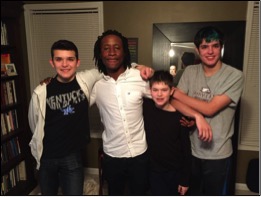Becoming Better Fathers – And Father Figures
4 min read
Date Published: 10/22/2015
Last Updated: 10/22/2015
National Fatherhood Initiative Blog / Latest Articles
4 min read
We’ve seen the staggering statistics regarding fatherless many times. John Sowers, in his book, Fatherless Generation, links fatherlessness to:
Lord knows we need more men to step up to be better fathers. Most of the posts on The Father Factor are about just that—fantastic resources for all of us men to become better fathers to our children. This post is slightly different.
My former posts here about building strong children, and about healing our own father wound were focused on us as fathers. This post is a heartfelt plea to consider becoming a father-figure to a fatherless child (or younger man) who is not your own biologically.
 I met Ricks only one week after he and his mother came from Liberia to the United States. They had spent the last nine years in Liberian refugee camps, and they arrived with only the clothes on their backs and one small backpack. Ricks was twelve years old then. He’s 21 today.
I met Ricks only one week after he and his mother came from Liberia to the United States. They had spent the last nine years in Liberian refugee camps, and they arrived with only the clothes on their backs and one small backpack. Ricks was twelve years old then. He’s 21 today.
In the years between, I’ve been a close friend to his family, and an informal mentor to him. Ricks seems to feel I’ve filled a father-figure role in his life. I received this beautiful text message last year from him: “Keith, thank you for being such an important person in my life. Happy Father’s Day.”
Though a mentor is not a father, and can never replace a missing father, we can make a significant impact and fulfill a desperately needed role in a young man’s or young woman’s life who doesn’t have a dad to relate to, communicate with, or receive love and guidance from.
All children yearn for their missing father, and that hunger never goes away. A committed and loving mentor cannot fully remove that hurt, but we can lessen the negative impact, and we can point kids in the right direction, not only potentially changing the course of that child’s life but also positively impacting society.
A beautiful Jewish teaching says, “To save one life is to save the world.” A profound privilege of mentoring is that by reaching one child, we can change the world. The impact and the effects can be as satisfying for the mentor as they are for the young men and women whose lives may be forever transformed.
As a youth pastor for ten years, I mentored hundreds of high school students, many of whom had poor or no relationships with their fathers. I didn’t fully realize it at the time, but I fulfilled a father figure role for many of those students, showing them what a father could be and helping them experience what a father’s love and approval could feel like.
As a founding board member and fatherhood trainer for the Prison Entrepreneurship Program in Texas for six years, I coached over 600 incarcerated men. I taught them how to reconnect with their kids whom most had abandoned, and how to learn to be better dads, even while still behind bars. I loved being a father figure mentor to these men, teaching them the essential fathering skills that became the core content of my book, How to Be a Great Dad—No Matter What Kind of Father You Had.
The skills of becoming a great mentor are fundamentally the same as those for becoming a great dad. I teach the men I now coach and mentor this simple and yet highly effective skill set: Affirmation, Acceptance, and Affection.
If every father and mentor would commit to learning these three easy-to-master skills, the entire world would become a better place. And millions of fatherless children would finally feel the love and receive the guidance they desperately need not only to survive this life, but to find their way, to succeed, and to enjoy healthy and loving relationships—most of which may remain out of reach without the skilled mentoring you and I can provide.
I applaud the wonderful work Esquire is doing through their Mentoring Project, seeking to raise the next generation of good men by training 100,000 new mentors by the year 2020. Perhaps you could become one of them.
A mentor is not a father, and doesn’t even have to be a (biological) father, but we can stand in the gap and provide the missing love and guidance children not only need but also crave. And believe me, I know first-hand that doing so is one of the most fulfilling experiences of life. I’ve trained hundreds of men how to affirm children, how to express acceptance, and even how to show affection in appropriate and meaningful ways.
You can become a great mentor by learning and applying the same fundamental skills that help me be a loving father figure to Ricks and a great dad to my own three teenage sons. I want you to feel the same joy in your heart I feel in mine, and to smile from ear to ear the way I do, when I read Father’s Day gratitude messages each year from all four of my sons. I’d love to help you. Please check out my completely free training videos today.
Have you ever mentored another dad or a child?
Stats at top of this post are reported in John Sowers, Fatherless Generation: Redeeming the Story (Grand Rapids, MI: Zondervan, 2010), 36-37.
Date Published: 10/22/2015
Last Updated: 10/22/2015
Download the ebook to learn how to create fatherhood initiatives that engage every sector of community life.

Train Your Staff
Fatherhood Programs
Fatherhood Data
© 2025 National Fatherhood Initiative®. All rights reserved.